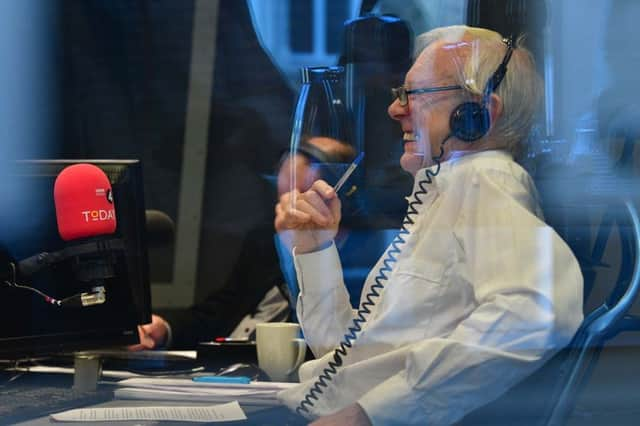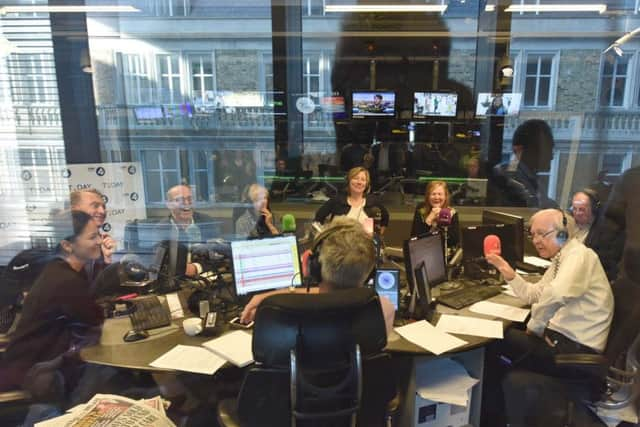It wasn’t John Humphrys who made the Today programme an institution – David Behrens


What did Lord Hall mean, exactly? That politicians would have an easier time under Humphrys’ successors? Or just that they would be glad to see the back of him?
He had been at the helm of the show since 1987, earning at his peak in the region of £650,000 a year. Even without the benefit of hindsight, it seemed an extraordinary amount. Humphrys did not make the show what it is; it was an institution before he arrived and had been so for three decades.
Advertisement
Hide AdAdvertisement
Hide AdIn fact, its greatest years were already behind it. Under Brian Redhead in the 1970s, it not only set the political agenda but gave it a distinctly northern perspective. The show was broadcast from Manchester as well as London, and Redhead seldom missed an opportunity to burst out of the Westminster bubble and talk up the region he loved.


Earlier still, there was Jack de Manio, a household name of the semi-detached era, whose reported irascibility made Humphrys seem like Ant and Dec, and who said what he thought, no matter who was listening. “Let us begin this morning by raising our hats to the London policemen who once again have had their weekends mucked up by a lot of silly hooligans,” he intoned in 1968, during the Grosvenor Square protests against the Vietnam war. He was eventually pushed out for being anti-European – which is perhaps why you don’t often hear his name mentioned.
He and Redhead existed within a different BBC. It was to the corporation that the nation had always turned in times of national mourning or celebration – Royal weddings, state funerals and cup finals – but not for its day-to-day news. That audience was tuned to ITN, which had bigger budgets and tighter deadlines. The BBC’s pre-eminence is only a recent phenomenon, brought about by the financial certainties that the licence fee uniquely affords it.
Advertisement
Hide AdAdvertisement
Hide AdIt is this luxury that has allowed the Today programme, during Humphrys’ era, to assume the role of a latter-day Spanish inquisition. No-one expected that, when he came on board.
On the contrary, it was the avuncular Jimmy Young on Radio 2 whom the Prime Minister of the day favoured for interviews. If Humphrys was a Rottweiler, as is often said, Jim was a tame poodle, which was why Mrs Thatcher preferred him.
I worked with him on his TV programmes in Yorkshire; he was insecure but also a warm and appreciative man. Humphrys, with whom I also worked once, I found charmless – a quality he also conveys rather well as host of Mastermind.
Advertisement
Hide AdAdvertisement
Hide AdHis departure from Radio 4 is not the watershed the BBC’s portentous coverage on Thursday suggested. It is less significant than Terry Wogan’s exit from his breakfast programme a decade ago, a loss that was felt far beyond the political classes.
Nevertheless, his fellow presenter, Justin Webb, has a point when he says that some of the criticism of Humphrys is downright ageist. Those who would not dream of being sexist or racist, he said, considered it an affront to hear a man in his 70s still broadcasting.
Only two things are required of a broadcaster: a decent voice and a credible intellect. Age might work against the former but it brings wisdom, which is the most valuable commodity of all.
Advertisement
Hide AdAdvertisement
Hide AdAnd Humphrys is a very considerable broadcaster. His evisceration of his own boss, the then director general George Entwistle, is one of the most compelling interviews ever committed to tape. Entwistle, you may recall, was made to admit that he had no idea his organisation was about to mistakenly implicate a Conservative peer in a child abuse scandal.
But his style of disembowelling politicians over the details of whatever back-of-a-fag-packet policy they are there to promote, has become tiresome and contributes little to intelligent debate. Half the time, he’s just shooting fish in a barrel.
The Today programme may make fewer headlines without him, but that is not its job. The show has an opportunity now to strike a more conciliatory and less metropolitan tone – and if it manages to do so, we may all be permitted that sigh of relief.